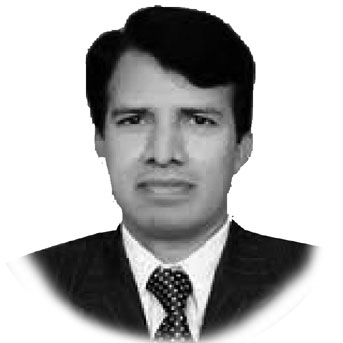Strengthening Pak-Iran relations
THE Foreign Minister of Pakistan Shah Mehmood Qureshi is on a three days official visit of Islamic Republic of Iran.
As scheduled, Mr Qureshi will meet his Iranian counterpart Mr Javad Zarif and other high level officials.
Qureshi will also meet Speaker of the Iranian Parliament Mohammad Bagher Ghalibaf and President Hassan Rouhani.
In the wake of changing regional geopolitical situation, visit of Pakistani Foreign Minister is being viewed as significant.
The likely agendas for the bilateral talks between the both countries includes; emerging security situation in Afghanistan, rising instability in Middle East, the developments over the Kashmir dispute and reinvigorating the Economic Cooperation Organisation (ECO).
Besides, strengthening the bilateral ties of both brotherly Muslim states will be focused during the meetings of both foreign ministers.
In the last few years, there have been regular visits of the high level delegations of both countries.
After visit of Mr Qureshi to Tehran in January 2020, Foreign Minister Zarif visited Pakistan in November 2020.
Both had a meeting on 30 March 2021, on the side-lines of the 9th session of the Heart of Asia-Istanbul Process Ministerial Conference in Dushanbe, Tajikistan.
Historically, the people and governments of Pakistan and Iran had enjoyed very strong ties. Both countries are geographical contiguous and share the religion, culture and civilization.
For centuries, the area now constituting Pakistan remained the hub of the Indo-Persian civilization that produced remarkable works of art, poetry, literature and great intellect.
After Pakistan came into being in 1947, natural affinity and closeness shared by these two neighbours was enhanced further and mutual ties of both flourished to new heights.
Traditionally Pakistani frontiers with Iran have always been peaceful, safe and secure. Iran was first country which recognized Pakistan upon its emergence as an independent country in 1947. Indeed, there have been historical linkages between the people of Pakistan and Iran.
Iranian migrants and Islamic preachers had left long lasting impression on people and civilization of Indian Subcontinent.
Towards beginning of 20th century, Iran had its security concerns arising from the expansionist designs of former Soviet Union besides an uneasy relationship with Arab world.
The emergence of a non-Arab Muslim country (Pakistan) in its neighbourhood provided it respite and reinforced its security.
Whereas, Pakistan, otherwise agonized over by Indian aggression and hostile Afghanistan, took Iran as its strategic partner.
Iran, indeed demonstrated this by providing all out assistance to Pakistan during 1965 and 1971 Indo-Pak wars.
First Pakistani Premier Liaquat Ali Khan visited Iran in 1949 and Iranian Shah reciprocated in 1950, as the first foreign head of state.
Thereafter both countries maintained their bilateral relationship in an atmosphere of Islamic brotherhood and as good neighbours, with mutual acceptability.
Pakistan along with Iran and Turkey established Regional Cooperation for Development (RCD), an inter-governmental organization for socio-economic development in the member countries in 1964.
The organization was renamed as Economic Cooperation Organization (ECO) in 1985 and its membership increased to ten in early 1990s with the integration of Central Asian States and Afghanistan.
Following the Islamic revolution in Iran in 1979, Pakistan was the first country, which recognized Revolutionary Iranian Government.
Besides sending high-level delegations then President, General Zia ul Haq himself visited Iran as a good will gesture in 1980 and 1981.
During Iran-Iraq war, Pakistan made hectic efforts to negotiate a deal between the two Islamic countries to end the war.
Pakistan also made its utmost efforts for the normalization of relations between Iran and Saudi Arabia and other Gulf countries.
The commendable aspects of the Pak-Iran relationship are such that, even during the tense decade of 1990s, there has never been a diplomatic impasse in their bilateral relationship.
Earlier in May 1998, upon Indian nuclear tests, Iran showed its concern and President Khatami in a statement said that; “We regard your security seriously and understand your position and the position of our brother, Pakistani nation.
The security of Pakistan, as a brother, friendly and neighbouring state, is crucial to us. We consider their issue to be extremely important and will stand by you.”
In 2016, immediately after the tense relationship between Iran and Kingdom of Saudi Arabia, then Pakistani Prime Minister, Mian Muhammad Nawaz Sharif and Army Chief, General Raheel Sharif visited Tehran and Riyadh.
Pakistani leadership tried to convince Saudi and Iranian leadership that, strained relationship and proxies would not be in the benefit of any of these countries and Muslim World.
Pakistan is still trying to play a constructive role in the bilateral relationship between Tehran and Riyadh.
In Nov 2017 Pakistani Army Chief, General Qamar Javed Bajwa visited Tehran and had an indepth discussion with Iranian military leadership for peace and stability of the region.
To reciprocate the visit of General Bajwa, Chief of Staff of Iranian Armed Forces Major General Mohammad Hossein Baqeri along with a high powered military delegation visited Pakistan in July 2018.
Pakistan and Iran are the leading countries of the Muslim world. Both need to play significant role towards unity of Muslims.
Promotion of peace in the neighbouring Afghanistan is a key challenge, which must be well negotiated in the wake of new time table given by US President Joe Biden for the pull out of US and NATO forces.
Pakistan desires that US must re-join the ‘Joint Comprehensive Plan of Action’ as agreed in July 2015 and immediately lift its un-warranted economic sanctions from Iran. Besides, there is a need for to enhance the volume of trade and people to people contact.
There is a requirement that both countries should undertake steps for deeper cooperation in the field of economy.
The ‘Treaty of Friendship to Initiate Trade Relations-1949’ must be re-evaluated for the promotion of trade and commerce.
The existing level of people-to-people contact must be enhanced for the development of confidence among the masses of both countries.
— The writer is Professor of Politics and IR at International Islamic University, Islamabad.







